 W
WMustique Airport is a private airfield owned by the Mustique Company for public use and is located on Mustique island, part of Saint Vincent and the Grenadines in the Caribbean Sea. It is used by civil aviation and national airlines using turboprop planes.
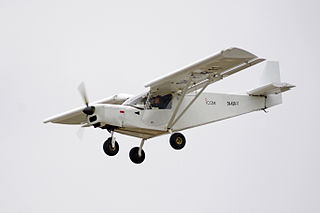 W
WA short takeoff and landing (STOL) aircraft has short runway requirements for takeoff and landing. Many STOL-designed aircraft also feature various arrangements for use on runways with harsh conditions. STOL aircraft, including those used in scheduled passenger airline operations, have also been operated from STOLport airfields which feature short runways.
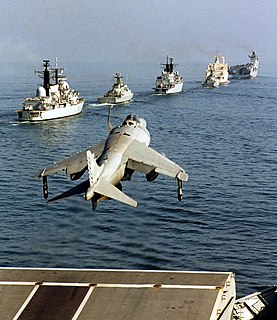 W
WA short take-off and vertical landing aircraft is a fixed-wing aircraft that is able to take off from a short runway and land vertically. The formal NATO definition is:A Short Take-Off and Vertical Landing aircraft is a fixed-wing aircraft capable of clearing a 15 m obstacle within 450 m of commencing take-off run, and capable of landing vertically.
 W
WUnion Island Airport is the airport serving Union Island, Grenadines Parish, Saint Vincent and the Grenadines. It is located about 0.25 miles (0.40 km) from the town of Clifton, one of the country's main tourist centers and a major destination for charter leisure flights during the winter holiday season and easter, for "Easterval" celebration. The airport serves as a focus city for flag carrier SVG Air and features flights to several short-haul regional destinations. It is the southmost airport of St. Vincent and the Grenadines.
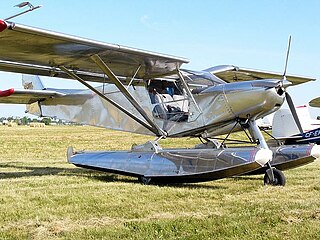 W
WThis is a list of aircraft which are classified as having Short Takeoff and Landing, or STOL, characteristics.
 W
WThe Angel Aircraft Corporation Model 44 Angel is a twin-engine STOL utility aircraft produced in the United States since the mid-1990s. Designed by Carl Mortenson and The King's Engineering Fellowship to be well-suited for missionary work from remote locations around the world, it is a low-wing cantilever monoplane with a retractable tricycle undercarriage and eight seats. The design is largely conventional, with the exception that the engine nacelles are mounted on top of the wings in a pusher configuration. Construction is aluminum throughout the airframe.
 W
WThe Antonov An-2 is a Soviet mass-produced single-engine biplane utility/agricultural aircraft designed and manufactured by the Antonov Design Bureau beginning in 1946. Its remarkable durability, high lifting power, and ability to take off and land from poor runways have given it a long service life. The An-2 was produced up to 2001 and remains in service with military and civilian operators around the world.
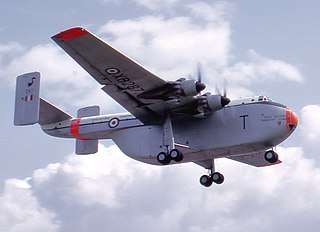 W
WThe Blackburn B-101 Beverley was a 1950s British heavy transport aircraft built by Blackburn and General Aircraft and flown by squadrons of the Royal Air Force Transport Command from 1957 until 1967.
 W
WThe Breguet 941 was a French four-engine turboprop STOL transport aircraft developed by Breguet in the 1960s. Although widely evaluated, it was not built in large numbers, with only one prototype and four production aircraft being built.
 W
WThe Britten-Norman BN-2 Islander is a British light utility aircraft and regional airliner designed and originally manufactured by Britten-Norman of the United Kingdom. Still in production, the Islander is one of the best-selling commercial aircraft types produced in Europe. Although designed in the 1960s, over 750 are still in service with commercial operators around the world. The aircraft is also used by the British Army and police forces in the United Kingdom and is a light transport with over 30 military aviation operators around the world.
 W
WThe de Havilland Canada DHC-2 Beaver is a single-engined high-wing propeller-driven short takeoff and landing (STOL) aircraft developed and manufactured by de Havilland Canada. It has been primarily operated as a bush plane and has been used for a wide variety of utility roles, such as cargo and passenger hauling, aerial application, and civil aviation duties.
 W
WThe de Havilland Canada DHC-3 Otter is a single-engined, high-wing, propeller-driven, short take-off and landing (STOL) aircraft developed by de Havilland Canada. It was conceived to be capable of performing the same roles as the earlier and highly successful Beaver, including as a bush plane, but is overall a larger aircraft.
 W
WThe de Havilland Canada DHC-4 Caribou is a Canadian-designed and produced specialized cargo aircraft with short takeoff and landing (STOL) capability. The Caribou was first flown in 1958 and although mainly retired from military operations, is still in use in small numbers as a rugged "bush" aircraft.
 W
WThe de Havilland Canada DHC-5 Buffalo is a short takeoff and landing (STOL) utility transport turboprop aircraft developed from the earlier piston-powered DHC-4 Caribou. The aircraft has extraordinary STOL performance and is able to take off in distances much shorter than even most light aircraft can manage.
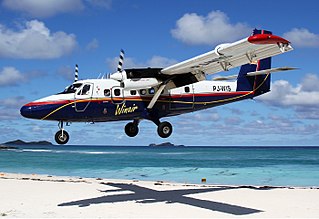 W
WThe de Havilland Canada DHC-6 Twin Otter, currently marketed as the Viking Air DHC-6 Twin Otter, is a Canadian 19-passenger STOL utility aircraft developed by de Havilland Canada and currently produced by Viking Air. The aircraft's fixed tricycle undercarriage, STOL capabilities, twin turboprop engines and high rate of climb have made it a successful commuter passenger airliner as well as a cargo and medical evacuation aircraft. In addition, the Twin Otter has been popular with commercial skydiving operations, and is used by the United States Army Parachute Team and the United States Air Force's 98th Flying Training Squadron.
 W
WThe de Havilland Canada DHC-7, popularly known as the Dash 7, is a turboprop-powered regional airliner with short take-off and landing (STOL) performance. It first flew in 1975 and remained in production until 1988 when the parent company, de Havilland Canada, was purchased by Boeing and was later sold to Bombardier. Bombardier sold the type certificate for the aircraft design to Victoria-based manufacturer Viking Air in 2006.
 W
WThe Dominion Skytrader was a Canadian prototype STOL utility aircraft, originally designed by the Dominion Aircraft Corporation in Vancouver, British Columbia, but built in the United States in the early 1970s. Attempts to market the aircraft continued until the late 1980s, but proved fruitless.
 W
WThe Dornier Do 27 is a German single-engine STOL utility aircraft that was designed and manufactured by Dornier GmbH. It was notable for being the first mass-produced aircraft in Germany following the end of the Second World War.
 W
WThe type designation Dornier Do 28 comprises two different twin-engine STOL utility aircraft, manufactured by Dornier Flugzeugbau GmbH. Most of them served with the German Air Force and Marineflieger and other air forces around the world in the communications and utility role. The Do 28 series consists of the fundamentally different Do 28 A/B (1959) and Do 28 D Skyservant (1966).
 W
WThe Dornier Do 29 was an experimental aircraft developed by Dornier Flugzeugwerke and the Deutsche Versuchsanstalt für Luftfahrt in the 1950s, used to test a tilting-propeller system for short takeoff and landing (STOL) aircraft. The concept was proved to be successful in flight testing; however, no further development of the system or aircraft was proceeded with, and at the conclusion of its test program the Do 29 was retired.
 W
WThe Dornier Do 228 is a twin-turboprop STOL utility aircraft, designed and first manufactured by Dornier GmbH from 1981 until 1998. 245 were built in Oberpfaffenhofen, Germany. In 1983, Hindustan Aeronautics (HAL) bought a production licence and manufactured another 125 aircraft in Kanpur, India. In July 2017, 63 aircraft were still in airline service.
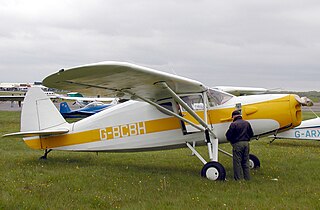 W
WThe Fairchild Model 24, also called the Fairchild Model 24 Argus/UC-61 Forwarder or Fairchild Model 24 Argus, is a four-seat, single-engine monoplane light transport aircraft designed by the Fairchild Aviation Corporation in the 1930s. It was adopted by the United States Army Air Corps as UC-61 and also by the Royal Air Force. The Model 24 was itself a development of previous Fairchild models and became a successful civil and military utility aircraft.
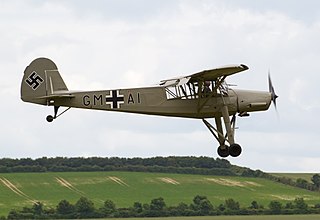 W
WThe Fieseler Fi 156 Storch was a small German liaison aircraft built by Fieseler before and during World War II. Production continued in other countries into the 1950s for the private market. It remains famous for its excellent STOL performance and low stall speed of 31 mph ; French-built later variants often appear at air shows.
 W
WThe Firecatcher Aircraft F-45 is a single-turboprop aircraft designed for aerial firefighting, air freight and commuter airline. It is financed by UK start-up Arcus Fire, designed by New Zealand firm Flight Structures and built by NZ's Pacific Aerospace. First flight is planned for 2023 and first delivery for 2024.
 W
WThe GAF Nomad is a utility aircraft produced by the Government Aircraft Factories (GAF) of Australia in Melbourne. Supported by the Australian Government, design work began in the mid-1960s, and it made its maiden flight on 23 July 1971. Despite some export sales and commercial operations, sales were not as sufficient and production stopped in 1985. The twin-turboprop, high-wing aircraft has a retractable gear and came in two variants: the initial N22, followed by the stretched N24.
 W
WThe Harbin Y-11 is a high wing twin-engine piston utility and geological survey aircraft built by Harbin Aircraft Manufacturing Corporation (HAMC).
 W
WThe Harbin Y-12 is a high wing twin-engine turboprop utility aircraft built by Harbin Aircraft Industry Group (HAIG).
 W
WThe Helio Courier is a cantilever high-wing light C/STOL utility aircraft designed in 1949.
 W
WThe Helio Twin Courier is a twin-engined version of the Helio Courier, with very few examples being produced.
 W
WThe Israeli Aircraft Industries Arava is a light STOL utility transport aircraft developed and produced by Israeli aerospace company Israel Aerospace Industries (IAI). It holds the distinction of being IAI's first indigenously-developed aircraft design to enter production.
 W
WThe Ikarus Kurir is a single-engined high-wing monoplane designed in Yugoslavia for army liaison and air ambulance work from small airfields. Built in large numbers, it served with the Yugoslav Air Force (JRV) until 1972, when it entered civilian use.
 W
WThe IMAM Ro.63 was an Italian STOL aircraft designed for short-range reconnaissance and light transport during World War II.
 W
WThe Just SuperSTOL is an American STOL amateur-built aircraft, designed and produced by Just Aircraft of Walhalla, South Carolina. The aircraft is supplied as a kit for amateur construction.
 W
WThe Kobeseiko Te-Gō was a Japanese two-seat STOL experimental reconnaissance aircraft developed by Kobe Steel in 1942 for service in World War II. In accordance with the Army's request, Professor T. Miki, Osaka Imperial University designed and Kobe Seikojo built the Te-Gō. No "Ki" code number was assigned there to since the project was outside the jurisdiction of the Army Aviation Headquarters.
 W
WNote: Not to be confused with the Mikoyan-Gurevich MiG-23, which was a completely different aircraft, though designed to fulfil the same specification.
 W
WThe North American Rockwell OV-10 Bronco is an American twin-turboprop light attack and observation aircraft. It was developed in the 1960s as a special aircraft for counter-insurgency (COIN) combat, and one of its primary missions was as a forward air control (FAC) aircraft. It can carry up to 3,200 lb of external munitions, internal loads such as paratroopers or stretchers, and loiter for three or more hours.
 W
WThe Northrop YC-125 Raider was a 1940s American three-engined STOL utility transport built by Northrop Corporation, Hawthorne, California.
 W
WThe PAC P-750 XSTOL, is a utility aircraft of conventional all-metal low-wing monoplane design, with fixed tricycle undercarriage. Combining the engine and wings of the PAC Cresco with a new large fuselage and modified tail, all versions to date have been powered by a 750 hp (560 kW) Pratt & Whitney Canada PT6 turboprop. It is designed and manufactured in Hamilton, New Zealand by Pacific Aerospace Limited.
 W
WThe Pilatus PC-6 Porter is a single-engined STOL utility aircraft designed by Pilatus Aircraft of Switzerland. First flown in 1959, the PC-6 was produced at Pilatus Flugzeugwerke in Stans, Switzerland. It has been built in both piston engine- and turboprop-powered versions and was produced under licence for a time by Fairchild Hiller in the United States. After around 600 deliveries in six decades, Pilatus produced the last one in early 2019.
 W
WThe Pilatus PC-8D Twin Porter was a Swiss ten-seat light transport built by Pilatus Aircraft. The type did not go into production and only one was built.
 W
WThe PZL M28 Skytruck is a Polish STOL light cargo and passenger plane, produced by PZL Mielec, as a development of license-built Antonov An-28s. Early licence-built planes were designated PZL An-28. The maritime patrol and reconnaissance variants are named PZL M28B Bryza.
 W
WPZL-104 Wilga is a Polish short-takeoff-and-landing (STOL) civil aviation utility aircraft designed and originally manufactured by PZL Warszawa-Okęcie, and later by European Aeronautic Defence and Space Company (EADS), who had acquired the original manufacturer during 2001.
 W
WThe RWD 9 was a Polish sports plane of 1934, constructed by the RWD team.
 W
WThe Scottish Aviation Pioneer was an STOL aircraft manufactured by Scottish Aviation in Scotland. It was used for casualty evacuation and communications and could accommodate a pilot and up to four passengers.
 W
WThe Scottish Aviation Twin Pioneer was a British STOL transport aircraft built by Scottish Aviation Limited at Prestwick Airport, Scotland, during the 1950s. It was designed for both civil and military operators. It was conceived as a twin-engined version of the Pioneer light transport. Both aircraft required "an area only 30m (99ft) by 275m (902ft) in which to operate."
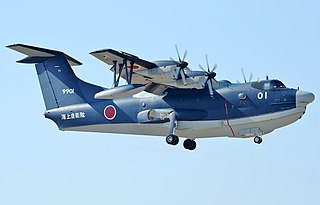 W
WThe ShinMaywa US-2 is a Japanese large short takeoff and landing amphibious aircraft developed and manufactured by seaplane specialist ShinMaywa. It was developed from the earlier Shin Meiwa US-1A seaplane, which was introduced during the 1970s.
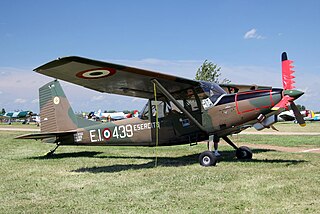 W
WThe SIAI-Marchetti SM.1019 is an Italian STOL liaison monoplane built by SIAI-Marchetti for the Italian Army, and based on the Cessna O-1 Bird Dog.
 W
WThe Slepcev Storch is a Serbian type-certified, kit and ultralight STOL aircraft, designed by Yugoslavian-Australian Nestor Slepcev and currently produced by Storch Aircraft Serbia in several different versions. The ultralight version is a 3/4 scale replica of the Second World War Fieseler Fi 156 and is supplied as a kit for amateur construction or as a complete ready-to-fly-aircraft.
 W
WThe Sukhoi Su-80 is a Russian twin-turboprop, twin-boom STOL transport aircraft.
 W
WThe Turbay T-3A was an Argentine twin-engined seven-seater light transport of the 1960s. A single example was built, but no production followed.
 W
WThe UTVA-66 is a STOL aircraft, which was produced in the former Yugoslavia. It was developed from the UTVA-60 and first flew 1966.
 W
WThe Westland Lysander is a British army co-operation and liaison aircraft produced by Westland Aircraft used immediately before and during the Second World War.
 W
WThe World Aircraft Vision, also called the Sentinel, is an American STOL amateur-built aircraft, produced by the World Aircraft Company. The aircraft was publicly introduced at Sun 'n Fun in 2012 and production is expected to commence in 2014. It is supplied as a kit for amateur construction or as a complete ready-to-fly aircraft.
 W
WThe Yakovlev Yak-12 is a light multirole STOL aircraft used by the Soviet Air Force, Soviet civilian aviation and other countries from 1947 onwards.
 W
WThe Zenith STOL CH 701 and CH 750 are a family of light, two-place kit-built STOL aircraft designed by Canadian aeronautical engineer Chris Heintz through his Midland, Ontario based company, Zenair. The CH 701 first flew in 1986 and the design is still in production. The CH 750 was first introduced in 2008. The CH 701 was later developed into the four-place Zenith STOL CH 801.
 W
WThe Zenith STOL CH 801 is a four-seat sport STOL aircraft developed by Chris Heintz and available in kit form from the Zenith Aircraft Company.